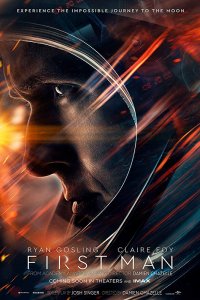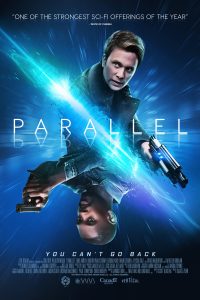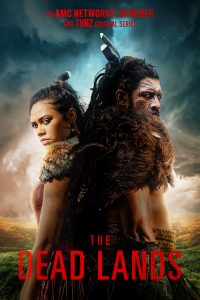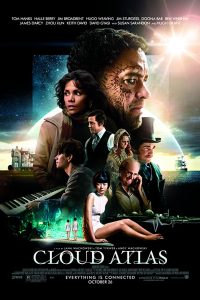One Small Step for a Family Man: Gary Westfahl Reviews First Man
 Some people may wonder why a science fiction film reviewer is discussing a completely realistic film about an actual man and his actual accomplishments. But I can offer a simple explanation: I am reviewing, reasonably enough, a remake of the film that won science fiction’s Hugo Award as the “Best Dramatic Presentation” of 1969: namely, “News Coverage of Apollo 11.” (For even though, as I have noted elsewhere, space travel has long been a reality, stories and films about space travel are still considered science fiction.) And to briefly sum up my evaluation of First Man, I would say that, as is so often the case, the original version was much better than the remake.
Some people may wonder why a science fiction film reviewer is discussing a completely realistic film about an actual man and his actual accomplishments. But I can offer a simple explanation: I am reviewing, reasonably enough, a remake of the film that won science fiction’s Hugo Award as the “Best Dramatic Presentation” of 1969: namely, “News Coverage of Apollo 11.” (For even though, as I have noted elsewhere, space travel has long been a reality, stories and films about space travel are still considered science fiction.) And to briefly sum up my evaluation of First Man, I would say that, as is so often the case, the original version was much better than the remake.
However, my opinion may not be everyone’s opinion, and I’ll freely admit that Damien Chazelle’s film is a superbly crafted work of art that has a considerable emotional impact even if, like me, viewers are aware of all its manipulative artifices and are striving to resist them. To determine whether someone will like First Man, then, I would ask them a seemingly irrelevant question: do you like watching NBC’s coverage of the Olympics? Now, one might naïvely believe that covering an event like the Olympics would be a straightforward task: you choose the most appealing competitions, you set up your cameras, and you televise all of those events. But the canny executives at NBC long ago realized that that wouldn’t work, because if you only show people the competitions, they won’t really care about who wins. So, if you’re covering, say, the women’s 500-meter race, you must first prepare and show a two-hour documentary about the principal American in the race, revealing how she struggled all her life to overcome one daunting obstacle after another and ultimately proved herself to be a wonderful person who has properly earned the opportunity to achieve the glory of an Olympic gold medal. Then, audiences will really care about who wins the race.
Thus, one can say, First Man covers the Apollo 11 moon landing in the same way that NBC covers the Olympics. Yes, you eventually get to see a twenty-minute re-creation of the event itself, but you must first watch a two-hour documentary about the innumerable travails experienced by its principal participant, commander Neil Armstrong (Ryan Gosling). And if I wasn’t particularly thrilled by First Man, it may reflect the fact that I dislike watching the Olympics, because I’m not fond of sentimental documentaries with cloying musical scores about one athletic paragon of virtue after another, occasionally interrupted by competitions that I have doggedly failed to develop an interest in; but many people enjoy watching the Olympics, which is why many people will undoubtedly enjoy watching First Man.
There is one difference between coverage of the Olympics and this film: NBC’s mini-documentaries may be selective and artful in what they include about the lives of celebrated competitors, but they are basically factual; however, in the fine print at the very end of the credits of First Man, the producers flatly admit what viewers who know anything at all about Neil Armstrong’s life have already figured out: that certain “characters and events” in the film “have been fictionalized.” And one motive for this, of course, was to relentlessly exaggerate the number and nature of the problems that threatened to prevent Neil Armstrong from fulfilling his destined role as the first man to walk on the Moon.
First, an unfortunate experience as a test pilot in 1961, the film suggests, inspired veteran pilot Chuck Yeager to seek his removal (which I suspect didn’t really happen). After his Gemini 8 spacecraft was briefly imperiled by uncontrollable spinning, the film suggests, NASA seemed poised to blame it all on Armstrong and kick him out of the program (which I suspect really didn’t happen). And after the accidental deaths in January, 1967, of the three astronauts scheduled to fly in Apollo 1, the film suggests, influential senators were ready to cut all funding for the space program, while mobs of people filled the streets of America demanding an immediate end to the space program and all of Armstrong’s dreams (which I know didn’t happen, though to support this false picture, the film transplants Gil Scott-Heron’s 1970 song “Whitey on the Moon” to 1967).
Ah, but these are only the problems that afflicted this film’s Armstrong in his professional life, which cannot compare to the emotional traumas that he faced in his personal life. It is true that Armstrong had a daughter who died due to a brain tumor, but while Karen Armstrong actually died at the age of two, the film makes his daughter considerably older in order to provide him with more, and more variegated, memories to be deployed in touching flashbacks. Of the eight men who were selected along with Armstrong as NASA’s second group of astronauts, two of them – Elliott See (Patrick Fugit) and Ed White (Jason Clarke) – died in horrific accidents before Armstrong reached the Moon; take a wild guess as to which two astronauts, according to this film, quickly became Armstrong’s closest friends, so that he could be especially devastated by their untimely deaths. There are also various issues with his wife Janet (Claire Foy) and sons Rick (Luke Winters) and Mark (Connor Blodgett) to further trouble this poor astronaut.
All of this is clearly designed to address an obvious problem in any effort to dramatize the life of Neil Armstrong: because it was very well known that he never liked to display his emotions, that trait had to be incorporated into any portrayal of the man. The most reasonable explanation for his behavior is that he just wasn’t a very emotional person, and when given a significant responsibility, he recognized the need to ignore any emotions he might be feeling and dispassionately concentrate on the tasks he had to perform. There is nothing wrong with being this sort of person, and it is certainly one reason why NASA entrusted Armstrong with their first mission to land on the Moon. This is also precisely the sort of professional that everyone wants to encounter in their own lives: if you are about to undergo quadruple-bypass heart surgery, you don’t want a surgeon who remains tormented by the tragedy of her son’s premature death; you want a surgeon who will put such concerns aside and focus on properly performing your surgery.
Yet contemporary filmmakers refuse to acknowledge that such people exist; their agenda is always to arouse their audience’s emotions, and this requires characters who are incessantly and overtly emotional. Thus, Chazelle and screenwriter Josh Singer develop an alternate explanation for Armstrong’s stoic demeanor: he is actually a seething cauldron of powerful emotions that he constantly feels compelled to suppress, except during private moments when he breaks down and cries like a baby. And one time when he is attending a reception and cannot express his grief in that fashion, he silently crushes his wine glass and makes his hand bleed. One doesn’t have to do research to know that these incidents are authorial inventions. When they can’t provide such interludes, the filmmakers endeavor to tug at our heartstrings with long lingering shots of Gosling’s impassive face as he presumably struggles with his conflicting emotions; however, as also demonstrated by the inefficacy of this strategy in Blade Runner 2049 (2017 – review here), forcing audiences to keep staring at an actor who isn’t doing or saying anything that truly commands their attention becomes irritating, not involving.
The need to convey this odd image of Armstrong also explains this film’s demonstrably false – even idiotic – rendering of Armstrong’s lunar landing. The complaint in early reviews was that the film omitted Armstrong and Aldrin’s planting of the American flag on the Moon; but American flags are observed in other scenes, and I can discern no desire to downplay the American nature of the lunar mission. The fact is that the film omits almost everything that actually happened on the Moon: there is no conversation with President Richard Nixon, no placing of instruments on the ground, no gathering of rocks. Even Armstrong’s crewmate and companion Buzz Aldrin (Corey Stoll) is only glimpsed a few times. Instead, the film erroneously asserts that Neil Armstrong spent most of his time on the Moon standing alone, doing nothing but remembering all of the happy times that he spent outdoors with his deceased daughter (observed in flashbacks), and finally depositing his daughter’s unquestionably non-existent charm bracelet on the Moon as his tribute to the daughter that the real Armstrong was unquestionably not thinking about while he was dutifully performing a series of assigned tasks on the Moon.
What makes this bizarre rewriting of history especially saddening is that it also trivializes the very reason that people wanted to go to the Moon in the first place. While he is being interviewed as a candidate for the space program, Gosling’s Armstrong is asked about the purpose of space travel, and he specifically discounts the notion that it should be about exploring the unknown or learning new things. Instead, noting that he had already flown to the edge of the atmosphere in experimental airplanes, he asserts that the true value of space travel is that it “changes your perspectives” – “it allows us to see things that we should have seen long ago.” And that’s why this film’s Armstrong doesn’t bother to set up scientific experiments or gather any specimens while he’s on the Moon; instead, standing on the barren plains of the Moon, he has finally learned to appreciate how wonderful Earth is, and how wonderful the people of Earth are, as he spends all of his time reminiscing about enjoying the beauties of nature with his family. Following the logic of this film, a biopic about Charles Darwin would argue the great thing about his visit to the Galápagos Islands was that he gained a new appreciation for the joys of living in England, as he ignores all the strange animals wandering around and remembers the pleasanter environment of his beloved home.
We’ll never know what Armstrong really said during that interview, but we do know what he said about the purpose of going to the Moon at a press conference before his flight, and his answer then was more conventional, according to Norman Mailer’s Of a Fire on the Moon (1969), which remains one of the liveliest and most insightful accounts of the Apollo 11 mission: after talking about potential economic benefits, he announced that “I think we’re going to the moon because it’s in the nature of the human being to face challenges.” But this image of humans as instinctive explorers and risk-takers, long promoted by scientist Carl Sagan and others, is no longer acceptable in Hollywood; rather it’s in the nature of the human beings to love their families, and to prioritize protecting their families and spending time with their families above all other considerations. Thus, Neil Armstrong must be presented as the ultimate family man, who can’t stop thinking about his family even at the moment when he becomes the first person to walk on the surface of the Moon.
This is hardly the first effort to present astronauts who are principally devoted to their families; for First Man reminded me of the first television series that endeavored to portray space travel realistically, Men into Space (1959-1960). The producers understood the challenge they faced, which was not unlike the challenge faced by the producers of First Man: hey, stalwart heroes in rocketships will appeal to kids and nerds, but a television series must also attract a larger audience of adult men and women. So they surrounded their astronauts with families, as episodes began and ended with the astronauts on Earth, enjoying backyard barbeques and dinner parties with their wives and children. But later episodes interestingly included fewer of these interludes, as writers instead brought domesticity into space by introducing female astronauts and scenes of men eating and relaxing on the Moon. However, outer space remains an alien and forbidding environment (explaining its continuing connection to science fiction), and it’s hard to make space seem like home sweet home, which is another reason why recent spacesuit films like Gravity (2013 – review here) and The Martian (2015 – review here) have shifted their focus from the colonization of space to frenzied efforts to get astronauts back home to Earth, and is another reason why this film’s Armstrong seems blind to the eerie beauty of the Moon and only longs to be back on Earth.
Indeed, one virtue of this film is that its six technical advisors, including Apollo 15 astronaut Al Worden, helped the filmmakers accurately convey in several scenes what the experience of space travel has actually involved: being imprisoned in a small metal box; enduring violent lurches and shaking as the vehicle struggles to reach orbit or to land; often having no idea what is actually going on, as tiny windows and instruments provide insufficient information; and facing the constant possibility of a mechanical failure that could cause instant death. Even the calmer and more spacious environments of the space shuttle and space station are unpalatable and unsettling, and the huge space habitats and domed lunar colonies of science fiction remain technologically and economically impossible dreams. In sum, people devoted to space travel can be heartened today to see an ongoing series of films that depict realistic space travel, and to hear of numerous governmental and entrepreneurial plans to expand the human presence in space; yet it also seems likely that, for a long time to come, people will have many good reasons to prefer life on Earth.
There is another way that First Man annoyingly fictionalizes the nature of space travel, rooted in a tendency long observed in literature: writers like to create and valorize heroes with special abilities who are uniquely qualified, and even destined, to save the day – you know, the peasant boy who is really the son of a king, or the young woman who is amazingly attuned to the Force. But as Arthur C. Clarke first explained in Prelude to Space (1951) – the first novel to predict something resembling our actual space programs – you can’t conquer space by waiting for ready-made heroes to come along. Instead, you must gather a group of people who meet certain qualifications, carefully train them, and when a mission is imminent, you select a few of them, knowing that if anything happens to one person in that crew, there are several possible replacements. In the American space program, Neil Armstrong was one of at least a dozen other astronauts who could have done his job equally well; he was probably chosen to be the first on the Moon because he was a civilian, and because he had previously confronted and overcome a serious problem in space, but if events had unfolded differently, the first man on the Moon could well have been Thomas Stafford of Apollo 10, or Charles Conrad of Apollo 12.
However, this film feels compelled to present Armstrong as the Chosen One, destined since birth to heroically go to the Moon. First, by my rough count, there are at least five scenes in which Gosling’s Armstrong looks up at the Moon. Second, it is indeed true that when Armstrong went to the Moon, he brought along a cassette recording of a 1947 album, bandleader Les Baxter’s Music Out of the Moon, with the opening track “Lunar Rhapsody.” However, I think it is very unlikely that it had long been Neil and Janet’s favorite song, which the film indicates when Neil plays the album during a moment of intimacy. Also, Armstrong did not go, and could not have gone, to the Moon alone, as he depended on the work of his crewmates Michael Collins (Lukas Haas) and Aldrin; but as noted, we see little of Aldrin, and Collins is virtually invisible, as the heroic Gosling is always center stage.
Finally, it seems that all spacesuit films are compelled to pay tribute to Stanley Kubrick and Clarke’s 2001: A Space Odyssey (1968), though First Man does so in understated ways. First, at certain moments, the music in the background is replaced by the sound of spacesuited astronauts breathing, a recurring feature of 2001. Second, although we do not hear the “Blue Danube Waltz” that accompanied the docking of Heywood R. Floyd’s spaceship to the space station when Armstrong’s Gemini 8 docks with the Agena satellite, Justin Hurwitz did write a special “Docking Waltz” to underscore that scene. Finally, Clarke himself appears in the film, in a clip from an interview that also included Kurt Vonnegut, Jr., although to reinforce the notion that America in 1967 was rising up in opposition to the space program, we only hear Vonnegut’s criticism of the space program, not the words of support that Clarke surely provided. One irony, of course, is that the greatest science fiction film of all time would never be approved for production today unless its script was revised to provide Dave Bowman and Frank Poole with loving families.
Directed by Damien Chazelle
Written by Josh Singer, based on the biography by James R. Hansen
Starring Ryan Gosling, Claire Foy, Jason Clarke, Kyle Chandler, Olivia Hamilton, Corey Stoll, Christopher Abbott, Ciarán Hinds, Patrick Fugit, Lukas Haas, Pablo Schreiber, Ethan Embry, Shea Whigham, Cory Michael Smith, Luke Winters, Connor Blodgett, Gavin Warren, and Lucy Stafford
Gary Westfahl has published 28 books about science fiction and fantasy, including Science Fiction Quotations: From the Inner Mind to the Outer Limits (2005), The Spacesuit Film: A History, 1918-1969 (2012), and A Sense-of-Wonderful Century: Explorations of Science Fiction and Fantasy Films (2012); excerpts from these and his other books are available at his World of Westfahl website (here). He has also published hundreds of articles, reviews, and contributions to reference books. His most recent books are the three-volume A Day in a Working Life: 300 Trades and Professions through History (2015), An Alien Abroad: Science Fiction Columns from Interzone (2016), the co-edited Bridges to Science Fiction and Fantasy: Outstanding Essays from the J. Lloyd Eaton Conferences (2018), and Arthur C. Clarke, part of the University of Illinois Press’s Modern Masters of Science Fiction series.
©Locus Magazine. Copyrighted material may not be republished without permission of LSFF.








